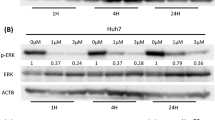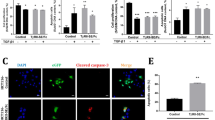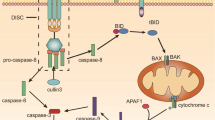Abstract
Despite impressive results obtained in animal models, the clinical use of Fas ligand (FasL) as an anticancer drug is limited by severe toxicity. Systemic toxicity of death ligands may be prevented by using genes encoding membrane-bound death ligands and by targeted transgene expression through either targeted transduction or targeted transcription. Selective induction of tumor cell death is a promising anticancer strategy. A fusion protein is created by fusing the extracellular domain of Fas ligand (FasL) to the peptide arginine-glycine-aspartic acid (RGD) that selectively targets avβ3-integrins on tumor endothelial cells. The purpose of this study is to evaluate the effects of RGD-FasL on tumor growth and survival in a murine hepatocellular carcinoma (HCC) tumor model. Treatment with RGD-FasL displaying an obvious suppressive effect on the HCC tumor model as compared to that with FasL (p < 0.05) and resulted in a more additive effect on tumor growth delay in this model. RGD-FasL treatment significantly enhanced mouse survival and caused no toxic effect, such as weight loss, organ failure, or other treatment-related toxicities. Apoptosis was detected by flow cytometric analysis and TUNEL assays; those results also showed that RGD-FasL is a more potent inducer of cell apoptosis for H22 and H9101 cell lines than FasL (p < 0.05). In conclusion, RGD-FasL appears to be a low-toxicity selective inducer of tumor cell death, which merits further investigation in preclinical and clinical studies. Furthermore, this approach offers a versatile technology for complexing target ligands with therapeutic recombinant proteins. To distinguish the anti-tumor effects of FasL in vivo, tumor and liver tissues were harvested to examine for evidence of necrotic cells, tumor cells, or apoptotic cells by Hematoxylin and eosin (H&E) staining.
This is a preview of subscription content, access via your institution
Access options
Subscribe to this journal
Receive 12 digital issues and online access to articles
$119.00 per year
only $9.92 per issue
Buy this article
- Purchase on Springer Link
- Instant access to full article PDF
Prices may be subject to local taxes which are calculated during checkout
Similar content being viewed by others
Author information
Authors and Affiliations
Corresponding author
Rights and permissions
About this article
Cite this article
Liu, Z., Wang, J., Yin, P. et al. RGD-FasL Induces Apoptosis in Hepatocellular Carcinoma. Cell Mol Immunol 6, 285–293 (2009). https://doi.org/10.1038/cmi.2009.38
Received:
Accepted:
Issue Date:
DOI: https://doi.org/10.1038/cmi.2009.38



